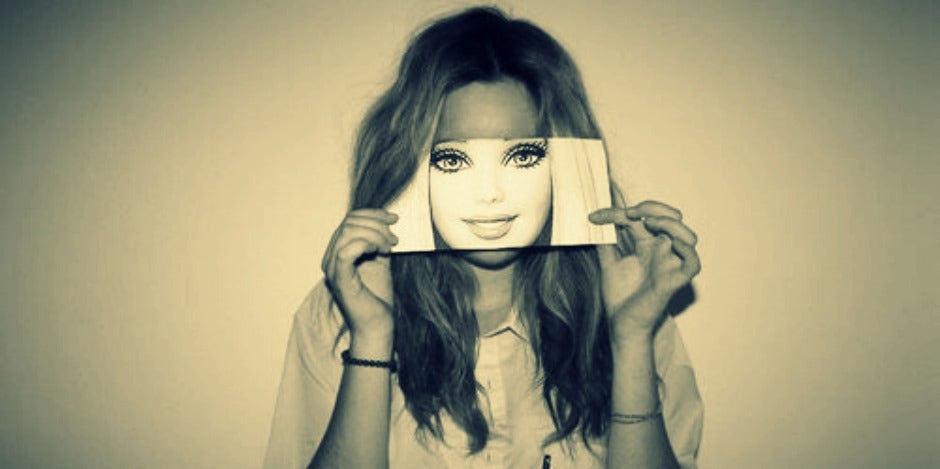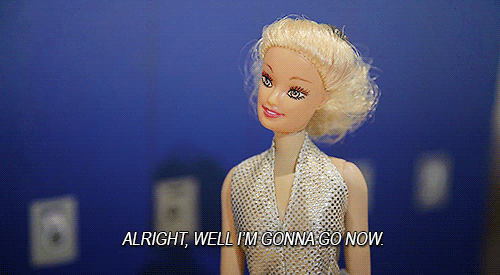8 Reasons Barbie Needs To F*ck Off
Buh-bye, barbs.

Growing up I had a friend who wasn't allowed to play with Barbie. She didn't have any Barbie dolls at her house, so when she came to our house it was like a kid in a candy store—she just couldn't get enough. I'd look at my Malibu Barbie, with her long flowing hair (just one of many Barbie dolls my sister and I had), and her Barbie Dream House, and Barbie Corvette, and think how cruel my friend’s mother was. How could anyone deny their daughter such fun?
But now, 20-something years later, I don't feel the same way I did then. In fact, if I were to have a daughter of my own, I wouldn't let her have a Barbie either. I don't care how much of an icon the doll is considered to be, for me, Barbie doesn’t really have a place anymore in this day and age, and I'm not alone in this sentiment.
This past Monday Mattel announced that things aren't going so well for them. Despite having just come out of the holiday season, their sales have plummeted. In the hopes of fixing things, there has been a change in management over the last couple days, but the real problem is that Mattel is trying to play "keep up with Jones's," with brands that offer more than just a piece of plastic for which to play. Barbie, regarded as a "core" toy for Mattel, has literally slipped into irrelevance despite attempts at new models that "carry a briefcase or drive the latest roadster."
I think what Mattel is failing to see, in so many words, is that it's time for Barbie to f*ck off. Yes, that's right. If you're sitting there, perplexed, as you scratch your head, about to tell me to "f*ck off," let me explain first. Then, if you still think I'm some sort of devil (which maybe I am!), you can tell me to bugger off.
1. Barbie sets really (and I mean REALLY) unrealistic body standards.
Yes, I know you’ve heard it before, but it’s true. And when you think about the fact that little girls who, when they grow up will face enough pressure from society and the media to keep their weight to an unrealistic amount, it’s just starting them off on the wrong foot.
If Barbie were a real woman, her waist would be a mere 16 inches. If you compare that to the U.S. average waist for a woman, which is 35 inches, it’s not just unrealistic, but absurd! If Barbie were real, she’d only have enough room in her body for half a liver. How the hell is champagne supposed to be properly filtered through half a liver?
2. Barbie doesn't age.
This year Barbie will turn 56 years old. Of course most little girls don't want to play with an old lady of a doll, but the fact that Barbie and her friends are all so young shows that there is no variation. There is beauty in getting older and accumulating the lines that come from a lifetime of laughter, and teaching that to girls early on could stop them from hating themselves when they reach a certain age.
3. There's an "Oriental" Barbie.
Where I come from (the year 2015 and the progressive city of NYC), referring to someone of an Asian ethnicity as "Oriental," is a whole boatload of wrong. Although the Barbie was originally made by Mattel in 1980, when, I guess the world was far less sensitive to these things, it still bears the same name and you can easily purchase it on Amazon or a variety of other places.
I realize that when it comes to "collectors" items" you want the original packaging in tact, but come on! At least try to update the marketing of it to "Asian." I’m not being uptight! I’m using basic logic and common sense here!
4. Barbie's lifestyle is a delusion joke.
When I was a kid, Barbie had her Malibu Dream House and her Corvette, as I mentioned. She also has her Ultimate Limo, Glam Convertible Car, and whatever the hell else that can only be associated with money, money, money.
According to the U.S. Census Bureau, as of 2013, 45.3 million people were living in poverty. And although Mitt Romney seems to think a middle class salary is somewhere between $200,000 and $250,000 a year, the reality is that it’s somewhere around $41,000 a year, with 25 million middle class families living paycheck to paycheck.
Movoto's chief economist has said that Barbie's "actual dream house," depending on where it is in Malibu, would range anywhere from $395,000 to $1 million. With the median yearly salary of the middle class being a measly $41,000 and the majority of the U.S. being in the middle class, that's not a very realistic house to purchase. Granted, $1 million is pocket change for the 1% out there, but for the rest of us, not so much.
5. There are way too many issues with "Black Barbie."
First of all, "Black Barbie" didn’t come to be until 1980, although she did have a black friend named Christie in 1968. But, as DNAinfo notes, it wouldn't be until 2009 when the black Barbie doll would finally display features that aren't only associated with Caucasians. In addition, Mattel has refused to make party products featuring black Barbie dolls for Barbie themed birthday parties.
In 2013, Karen Braithwaite, launched a Change.org petition hoping to remedy the situation. When Braithwaite spoke to Mattel about the issue she was told by executives, "Licensees don't want ethnic-themed images for party supplies because large retailers won't buy them." So we’re not just talking about Barbie being non all–inclusive, but racism.
6. Barbie screws up career ambitions of little girls.
It's bad enough we live in a society that still thinks math and sciences are for boys and men only, but when a doll promotes such thinking then it really needs to go. A 2014 study found that even when Barbie is dressed up as a doctor, she doesn't allow for girls to see themselves in such careers. As the studied concluded, after asking girls to interpret how they viewed potential careers for themselves after playing with Barbie and Mrs. Potato Head (I didn’t even know she was still around!), "Barbie may be one way that ideas about a girls' place in the world is communicated to the girl. Perhaps Barbie can 'Be Anything,' but girls who play with her may not apply these possibilities to themselves." But what can we expect from a doll that has her own Dream Kitchen? The only thing dreamy about a kitchen is whether or not there’s leftover pizza in the fridge.
7. Barbie is the perfect example of the sexualization of girls’ toys.
Last year, in case you missed it, Sports Illustrated's swimsuit issue featured a four-page spread of Barbie, and although Mattel even admitted that the pictorial "is not a program targeted towards girls," it's still a doll that millions of little girls love, in an issue often wrought with controversy because of the sexual images. As Eve Vawter of Mommyish wrote:
"Our girls are only so young for such a very short time, and taking one of her toys and putting it alongside sexualized and dehumanized images of women to fall under the male gaze is wrong on so many levels. It's bad enough this toy is sexualized as much as it is, and by sticking her in with other women in a sexy photo spread we are making no doubt about it. Barbie is no longer just a doll. She is a sex doll."
Even in 1976 Barbie's original designer, Bill Barton, shared his disappointment in how Barbie had evolved. "She’s become a sex symbol," he said of the doll he had created for little girls. "I really have misgivings about what's happening today. She has gotten too sexy." And that was almost 40 years ago.
8. It's 2015, for f*ck's sake.
There is no doubt that Barbie had her place and time. I will concede to that, but the fact is that it's been over a half century since her creation, and Barbie doll lovers everywhere need to concede, too, that this is different era. We want more for our daughters than kitchen sets, dream houses, and flight attendant costumes. I'm not saying it’s wrong to have dreams, to be a stay-at-home mom, or be a flight attendant, hell, I'd love to be a flight attendant, but what I am saying is that there are more options for women today. We should not only want more for our girls, but expect more from them, too.
With today's technology, we can show our kids that there are no limitations to what they can achieve when they put their minds to it, and toys centering on learning and evolving intellectually should be the focus. Barbie will always have her place in the past, but maybe in this century, that place should be in the back of some dark closet somewhere.
It's easy to say, "Oh, she's just a doll," but she's also "just a doll" that's impacting the women our girls will be when they grow up, even if you don't want to see it that way.
YourTango may earn an affiliate commission if you buy something through links featured in this article.
More related stories from YourTango:
- Adultery Benefits Women? A Case for Ashley Madison
- What Women Really Think of Tinder
- 7 Sex Positions Men Love
Photo: We Heart It


